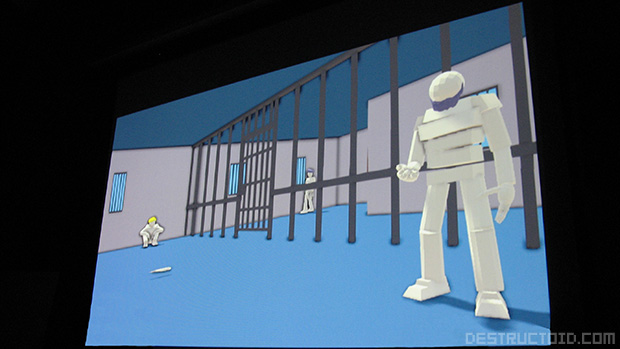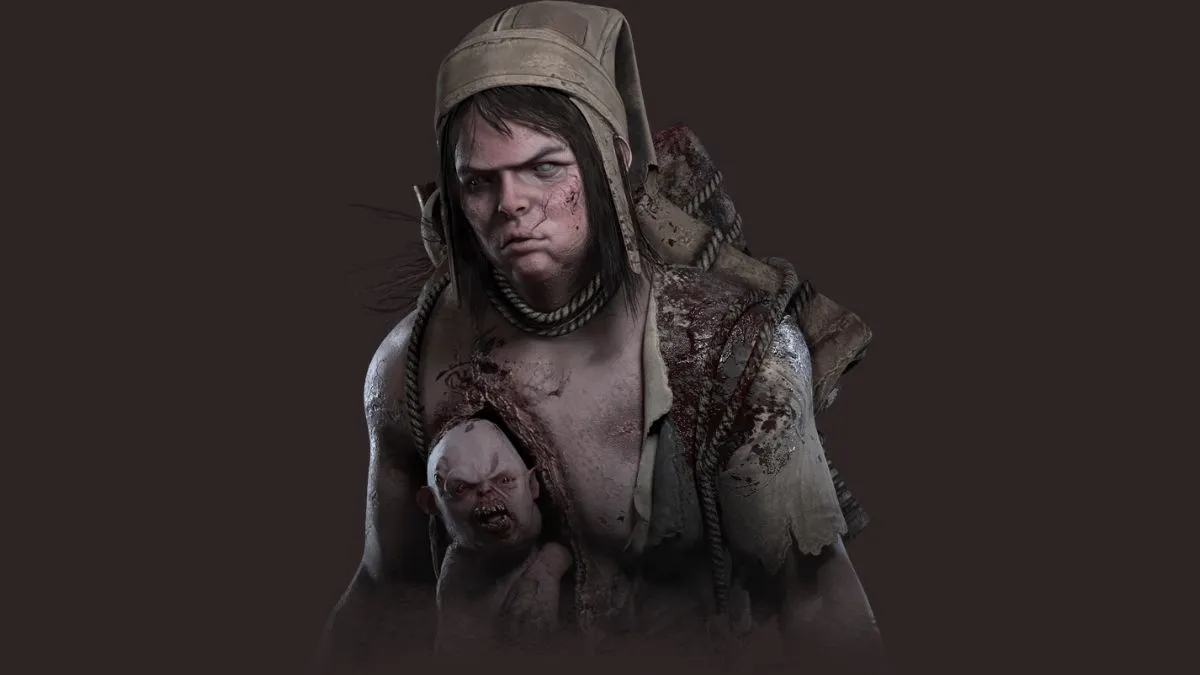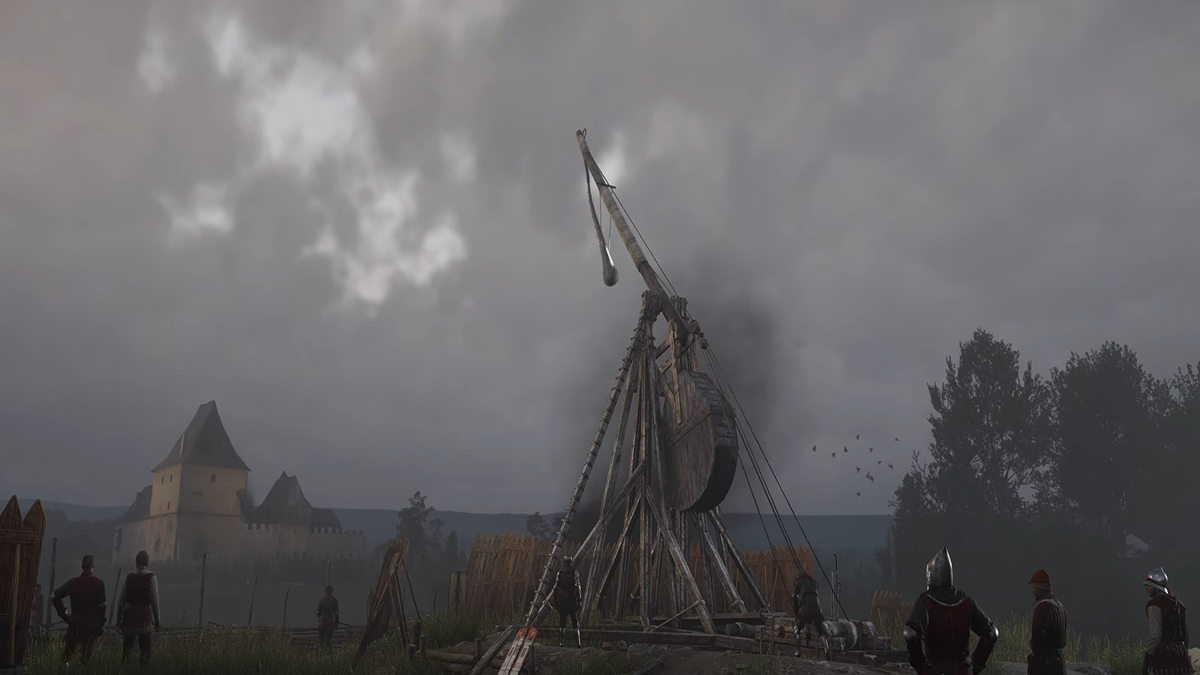“This thing that I’m going to show you is a really weird thing,” said Tim Schafer, the founder of beloved studio Double Fine Productions, during a recent presentation at New York University. He had come to speak at the school’s Game Center as part of its Lecture Series, whose previous guests include Valve game writer (and former Double Fine employee) Erik Wolpaw.
Schafer was speaking about an early prototype for a Kinect title that Double Fine had worked on, called “Specs.” He demoed two versions of the game, one that showed off the basic concept and another that looked closer to a product that might actually have seen release. Both prototypes exhibited Double Fine’s trademark humor, but alas, “Specs” isn’t something the public will ever play.

Double Fine’s periodic internal game jam, “Amnesia Fortnight” — a two-week period in which four small teams each try to turn a different idea into something that could be a game — is the genesis of many of the studio’s recent releases, including Sesame Street: Once Upon A Monster and Costume Quest. But it had nothing to do with “Specs.”
The launch of Heavy Rain in early 2010 got a lot of people “excited about interactive narrative and branching storylines,” said Schafer, calling Quantic Dream’s thriller “a very high-production-value game that did some interesting things with being able to control the story.” About a year ago, an unnamed publisher came to Double Fine not with an idea for a game, but a type of game: one with a story that, like Heavy Rain’s, changes based on player interaction.
Schafer hadn’t previously thought of making a game similar to Heavy Rain, “because it just looks really hard. And I like to do easier things.” But since Double Fine is renowned for its story-based games, he considered the publisher’s pitch. At the same time, the studio began to investigate new interfaces for adventure games, and landed on Microsoft’s recently released Kinect sensor as a possibility. In the ’90s, the LucasArts adventure titles with which Schafer made his name each had a list of verbs at the bottom of the screen. “What if,” Schafer wondered, “instead of […] verbs, there were just emotions?”
[Demo of the first “Specs” prototype, courtesy of Joystiq]
Heavy Rain saw the player switch between four different protagonists. Schafer came up with something more “sadistic and cruel” — playing as a cursed artifact who was screwing with people on a ship. “Someone had stolen this artifact from a tomb and was taking it back home, and the artifact was going to screw with everybody, to make the ship crash, or make it turn around and go back home to bring the artifact back to where it belonged.”
The initial “Specs” prototype came out of that brainstorm, and Schafer played it in the NYU lecture hall for us. The gameplay conceit was a cursed artifact through which you could manipulate the emotions of the person holding said artifact, which, in this version of “Specs,” was an amulet. Initially, there were two emotions: “love,” which Schafer conveyed by pointing at something with his right hand, and “hate,” which emanated from his left hand. But even those seemingly limiting constraints offered a hilarious variety of story outcomes.
Schafer’s demo opened with two prisoners in a jail cell with a shiv between them on the floor, and a guard outside. The older prisoner was already holding the amulet. Schafer told him to “love” the shiv, which eventually caused the criminal to pick it up. From there, Schafer directed “hate” toward the younger prisoner, which led to the older man stabbing him. In another play-through, Schafer had the older guy pick up the shiv and “love” his cellmate, so the two of them hatched a plan to escape by faking a stomachache and then stabbing the guard. (At this point, the dialogue was text-only, but if you can catch it in the video above, it’s pretty funny.)
The publisher loved the prototype, so Double Fine went forward with it. They spent six months putting together a second, more fully formed version of “Specs.”
[Partial demo of the second “Specs” prototype, courtesy of Joystiq]
For the second “Specs” prototype, Schafer wrote an entire back-story for the artifact, which, by that point, had morphed from an amulet into a dagger. The emotional depth grew to love/hate, courage/fear, and trust/distrust. In addition, Double Fine hit on a way to have the player physically convey those emotions: making gestures that Kinect would recognize. The cursor-like method in the original “Specs” was essentially no different from using a mouse on a computer, Schafer pointed out, and it didn’t take full advantage of the skeleton-tracking technology inside Kinect.
To show love, for example, Schafer held his hand over his heart. When he was scared, he covered his eyes, and he shook his fist in the air to convey hate. Showing distrust was a matter of crossing his arms. And since “Specs” was a Double Fine adventure game, exhibiting a particular emotion would not only advance the story — it would do so with humor.
Double Fine did rudimentary art and voice work for the next version of “Specs” — Schafer himself recorded lines for the protagonist, Thurston Robert Hackett. A rich adventurer, Hackett took his submarine to a ship upon which the love of his life was set to marry another man: his goal was to break up the wedding and win his woman back. Schafer purposely didn’t make him a sympathetic character, since you would be playing as the capricious dagger controlling his emotions. “It was a lot more fun to write when you just didn’t care if anybody liked anybody,” he told us.

Upon landing below deck, Hackett had to choose between a wetsuit and a workman’s coveralls. Schafer tagged either pair of clothes, and then gestured to express his feelings about it. At first, he distrusted them; Hackett noted that they weren’t quite “tailored to fit.” Then, when Schafer expressed fear, Hackett mused that they were probably infested with spiders. And when Schafer decided to love the brown clothes, Hackett said, “Those coveralls look adorably working-class! I love them,” and put them on. While he was steeling himself to enter the belly of the boat, a rat showed up. By expressing fear, Schafer got Hackett to flee through a door; Schafer noted that he could’ve also moved forward by showing courage.
Schafer told us that the publisher didn’t have faith in the expression of emotions as the sole gameplay mechanic. So Double Fine implemented other gestures, such as for ripping a poster off of a wall to uncover a vent. While traveling through it, a gesture prompt came up, and Hackett was able to overhear a conversation that provided some more back-story. The vent led to the ship’s engine room, where Hackett found a bomb. Only showing courage would get him to attempt to disarm it.
During that attempt, a woman surprised Hackett in the engine room. Schafer had Hackett hand over the dagger so that she would trust him; with the woman under the spell of the blade, Schafer expressed hate toward Hackett, which caused her to knock him out. But Schafer failed to successfully complete the motion-controlled bomb-defusing mini-game — Hackett woke up and escaped just as the bomb went off in the woman’s face.
That was one of five possible endings in the second “Specs” prototype, and Schafer said that it had taken “tons of work” just to craft that material in a very basic 3D engine. Ultimately, the publisher decided not to pursue the project. Schafer told us it’s not likely that “Specs” will ever see the light of day, which is why he decided to demo it as an insight into Double Fine’s development process.




